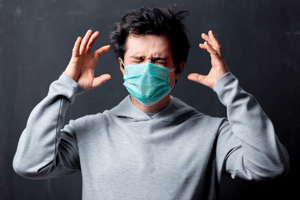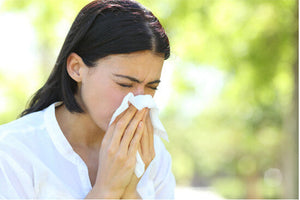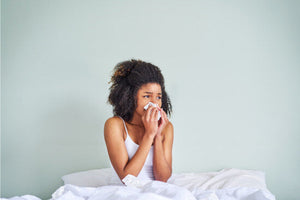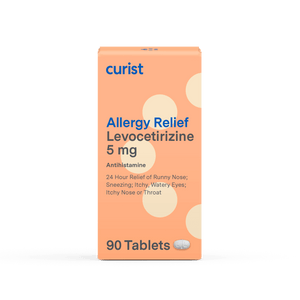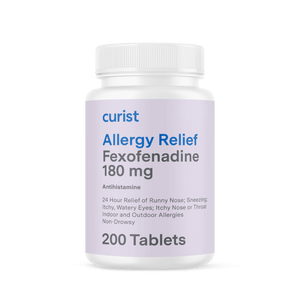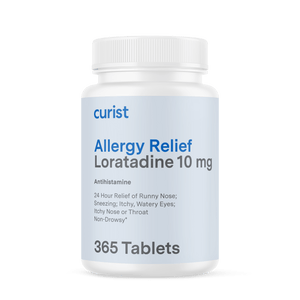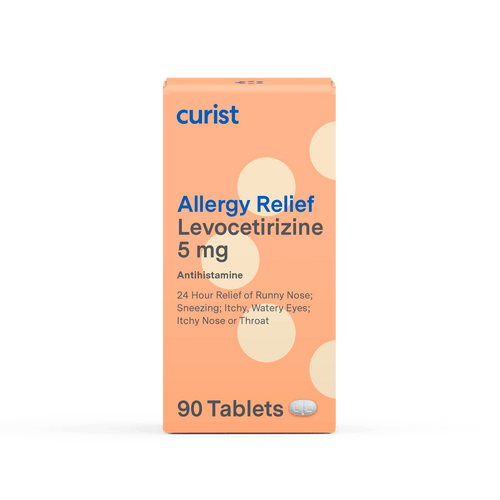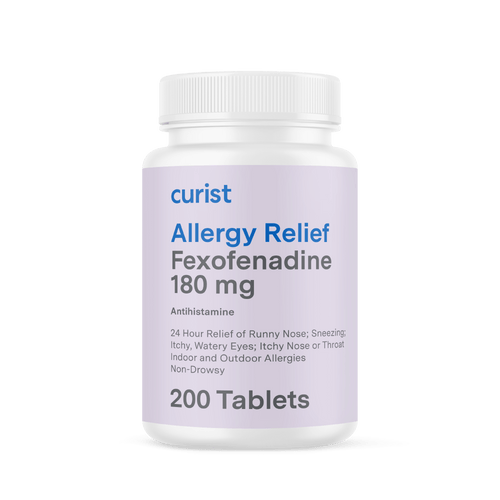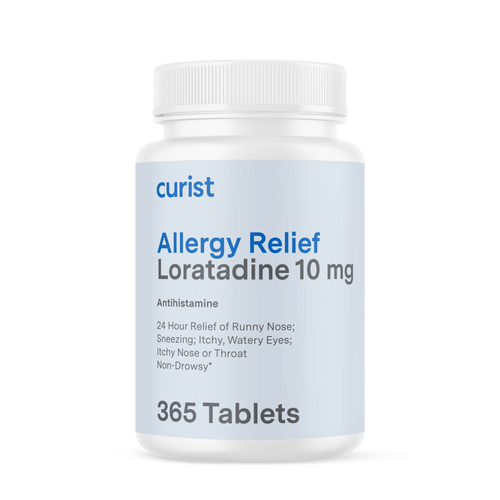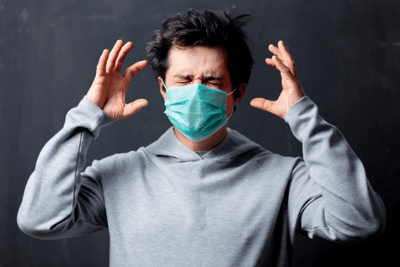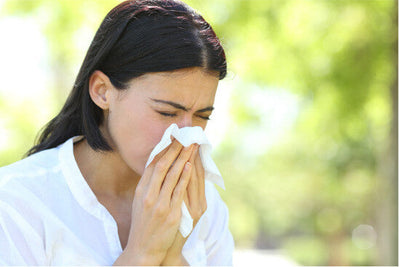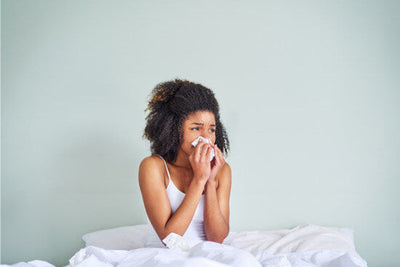by Dr. Marc Goldstein, MD, Curist Chief Allergy Advisor and Dr. Waverly Yang, Pharm D, Curist Pharmacy Advisor
Curist delivers over-the-counter medicines to your door at a fraction of the price of traditional brands. We hope everyone stays safe and healthy during this time.
Across the U.S., states have been administering doses of the coronavirus (COVID-19) vaccine to millions of people. Polls show that most Americans appear willing to take the vaccine, though there are concerns about allergic reactions and the COVID-19 vaccine. This article will help answer many common questions about the COVID-19 vaccine, specifically regarding allergies.
What Coronavirus (COVID-19) Vaccine Is Available?
The U.S. Food and Drug Administration (FDA) has approved emergency use of Pfizer and BioNTech’s (herein, Pfizer) COVID-19 vaccine, and, more recently, the Moderna COVID-19 vaccine.
Even with these agency approvals, many Americans are asking: is the vaccine really safe, particularly for people with severe allergies to peanuts, eggs, or other food allergens?
Does the Coronavirus (COVID-19) Vaccine Cause Severe Allergic Reactions?
As of January 6, 2021, CDC officials stated that there had been 29 severe and potentially life-threatening allergic reactions (anaphylaxis) out of a reported 1.9 million doses of the Pfizer and Moderna vaccines administered, and none of these cases has been fatal. About 71 percent of these reactions occurred within 15 minutes of vaccination.
Thus far, the U.S. media have reported closely on a number of allergic reactions. The first U.S. allergic cases occurred on December 16, 2020, when two health care workers in Alaska had significant allergic reactions, one of which was anaphylactic, about ten minutes after receiving their first respective doses of the Pfizer coronavirus (COVID-19) vaccine:
- The first worker, a middle-aged female with no history of allergies, developed a rash over her face and torso, experienced shortness of breath, and exhibited an increased heart rate. She was treated repeatedly with epinephrine and steroids and required hospital care, including admission to the intensive care unit (ICU).
- The second U.S. health care worker, who is male, experienced lightheadedness, a scratchy throat, and puffy eyes. He was treated with epinephrine, Pepcid, and Benadryl, and was able to recover within an hour and was subsequently released from the hospital.
As of mid-February 2021, there were no reported plans for pausing U.S. vaccine distribution, despite these cases. Current U.S. guidelines require vaccine recipients with a history of anaphylaxis to be observed for adverse reactions for 30 minutes after vaccination, while all other persons should be observed for 15 minutes.
In the United Kingdom, two health care workers with a history of severe allergic reactions were reported to have experienced allergic reactions to the Pfizer vaccine, and neither individual was known to have issues with any of the vaccine’s ingredients. Following these cases, UK regulators suggested that “people with a significant history of allergic reactions do not receive this vaccination.” U.S. regulators, however, have commented that this prohibitory precaution may be an overreaction to the actual risk.
As of December 26, 2020, one Boston doctor had experienced an anaphylactic reaction to Moderna’s vaccine and reported dizziness and a racing heartbeat immediately after receiving the vaccine. The doctor was permitted to self-administer his EpiPen, which he carries due to a shellfish allergy. Moderna’s medical safety team is looking into the matter.
What Ingredients in the COVID-19 Vaccine Can Cause Allergic Reactions?
The FDA and CDC are actively investigating the aforementioned allergic reactions, but there is currently not enough data to determine whether an ingredient in the vaccines caused the allergic reactions, or whether the reactions were related to vaccine administration. As of December 21, 2020, the National Institutes of Health (NIH) was planning a study to determine why some people have severe allergic reactions to the Pfizer - BioNTech vaccine and to identify the ingredient most likely responsible for these reactions. The study will administer the vaccine to volunteers with a history of severe allergic reaction, and these individuals will be vaccinated under close supervision.
The ingredients in the Pfizer and Moderna vaccines are simple. The only active ingredient is nucleoside modified messenger RNA (mRNA), which is genetic material that instructs cells to produce a protein that looks like the spike protein of coronavirus. This tricks your immune system into thinking it has an infection to fight and triggers it to produce antibodies against the spike protein, which will help fight off future COVID-19 infection.
Experts say that the genetic material, which degrades within a day of injection, seems unlikely to produce an allergic reaction, also due to its size and structure.
We are currently aware of one chemical ingredient in both the Pfizer and Moderna vaccines that is known to be capable of causing a severe allergic reaction: polyethylene glycol (PEG), which is a preservative used to help protect the vaccine and an ingredient typically found in cosmetics, processed foods, ultrasound gel, laxatives, and injectable steroids. More than 2 out of 3 people reportedly have antibodies to PEG, which is a highly uncommon allergen, but some experts suggest that it could be the allergy-inducing culprit in these vaccines.
How Common Are Allergic Reactions to The Coronavirus (COVID-19) Vaccine?
Just like drugs, vaccines can cause allergic reactions, including severe, life-threatening reactions, but such reactions are rare. Large studies show that potentially life-threatening, allergic reactions (called anaphylaxis) typically occur at a rate of 1.31 cases per million vaccine doses given. Currently, it appears that the Pfizer and Moderna vaccines have resulted in 11.1 cases per million doses administered. Although the rate of anaphylaxis for the COVID-19 vaccines appears significantly higher, experts still consider them to be very safe, even as they continue to track and investigate cases.
Late-stage Pfizer COVID-19 vaccine clinical trials found that the allergic reaction rate was 0.63% in 42,000 vaccine recipients, compared to a 0.51% allergic reaction rate in those who received placebo. The difference is not statistically significant, and this finding indicates that just as many people had allergic reactions to the placebo as the actual vaccine. Patients with a history of severe allergic reactions, however, were excluded from participating in the Pfizer clinical trial. These trials studied the vaccine in people 16 and older, but did not include pregnant or lactating women.
According to Moderna, two volunteers in its late-stage clinical trial had anaphylactic reactions, but neither reaction appeared to be caused by the vaccine because they occurred weeks or months following vaccination. Unlike the Pfizer clinical trial, patients with a history of anaphylaxis were permitted to participate in Moderna’s trial. These Moderna trials studied the vaccine in people 18 and older, but did not include pregnant or lactating women.
Generally, it is worth noting that rare allergic reactions are more likely to appear as a vaccine moves out of clinical testing and into broader distribution.
If I Have a History of Severe Allergies, Should I Get a COVID-19 Vaccination?
As noted above, there have been 29 cases of anaphylaxis reported in the United States thus far, and it is still considered a highly rare outcome. For most people, even those with a history of allergic reactions, the known benefits of receiving the COVID-19 vaccine will outweigh the potential risk of an allergic reaction.
The CDC recommends that people with a history of severe allergies consider getting vaccinated, unless they have had:
- a severe allergic reaction after a previous dose of the vaccine, or
- a severe allergic reaction to any ingredient of the vaccine.
If I Have a History of Severe Allergies, What Should I Bring To My COVID-19 Vaccination?
If you have a history of severe allergic reactions, it is important to take the following steps before receiving the vaccine:
- Consult with your doctor prior to getting the vaccine to make sure that you are not allergic to one of the vaccine ingredients, such as polyethylene glycol (PEG). Your doctor should conduct a risk assessment to determine the type/severity of past allergic reactions and to review the circumstances under which they occurred.
- If you have already had an allergic reaction to a first dose of the vaccine, you must consult with your doctor to make sure you are not endangering yourself.
- Whether you are getting the vaccine at a hospital, pharmacy, or pop-up site, confirm ahead of time that the facility has the appropriate supplies and staff to treat anaphylaxis and is located in a place where an ambulance can arrive within 5 to 10 minutes.
- If you have an EpiPen, bring it with you and make sure you know how to use it. Confirm that the facility administering the vaccine has staff who can administer it to you if necessary.
- Upon receiving the vaccine, wait at least 30 minutes after the vaccine injection to make sure that you can get fast treatment if you have an allergic reaction.
If I Have Egg Allergies, Should I Get The COVID-19 Vaccine?
In general, the most common allergic reactions to other vaccines are caused by inactive components, such as gelatin, egg protein, thimerosal, formaldehyde, latex (found in the rubber stoppers of vaccine bottles), and other possible excipients (which are inactive substances that serve as a vehicle or medium for an active substance like coloring agents, preservative, and fillers).
Unlike many flu vaccines which contain ingredients derived from eggs, the Pfizer and the Moderna coronavirus vaccines do not include ingredients derived from eggs or any other food protein, so they are unlikely to cause an allergic reaction for that reason.
What Are Side Effects in People Who Don’t Have Severe Allergies?
Even vaccine recipients without severe allergies should expect some potential side effects, including pain at the injection site (sore arms), tiredness, headache, muscle pain, chills, joint pain, and fever.
Both the Pfizer and Moderna vaccines require two rounds of vaccinations; for both vaccines, more recipients experienced side effects after the second dose than after the first dose.
Should I Take An Antihistamine Before COVID-19 Vaccine To Prevent Anaphylaxis?
According to the CDC, it is not currently recommended to take an antihistamine before receiving the COVID-19 vaccine. “Antihistamines do not prevent anaphylaxis, and their use might mask cutaneous symptoms, which could lead to a delay in the diagnosis and management of anaphylaxis.” Instead, if you are concerned about anaphylaxis to the COVID-19 vaccine, discuss with a doctor prior to receiving the vaccine. After receiving the vaccine, make sure to stay at your vaccination site so that any allergic reaction or anaphylaxis can be treated promptly.
Should I Take Acetaminophen or Pain Relievers Before Getting the COVID-19 Vaccine?
Because of the common side effects to the COVID-19 vaccines (like headaches, muscle pain, chills, and fever), experts recommend that people anticipate not going to work on the same day they get vaccinated or, potentially, even the day after. COVID-19 vaccine recipients may also consider taking a pain reliever, like acetaminophen (available at Curist), after they receive the vaccine if they have any side effects. According to the CDC, it is not recommended to take pain relievers before the vaccine as the interaction with the vaccine in advance of receiving a dose is currently unknown. Please note that a pain reliever will not prevent any allergic reaction to the vaccine.
When Can I Get the COVID-19 Vaccine?
Although the federal government's Operation Warp Speed manages vaccine shipping, each state will be able to determine who gets its vaccine first. States are largely expected to follow federal guidelines, which have recommended that healthcare workers and employees/staff of long-term care facilities, such as nursing homes, be prioritized for vaccine eligibility. The next priority tier for COVID-19 vaccination are essential workers, people 65 and over, and those with underlying medical conditions that put them at higher risk. According to the incoming U.S. Surgeon General Vivek Murthy, most other Americans who do not fall into these groups are expected to be eligible to receive a COVID-19 vaccine by summer or fall of 2021.
For more information about coronavirus, please visit the CDC website. As always, if you are not feeling well, please reach out to your medical provider or call 911.

